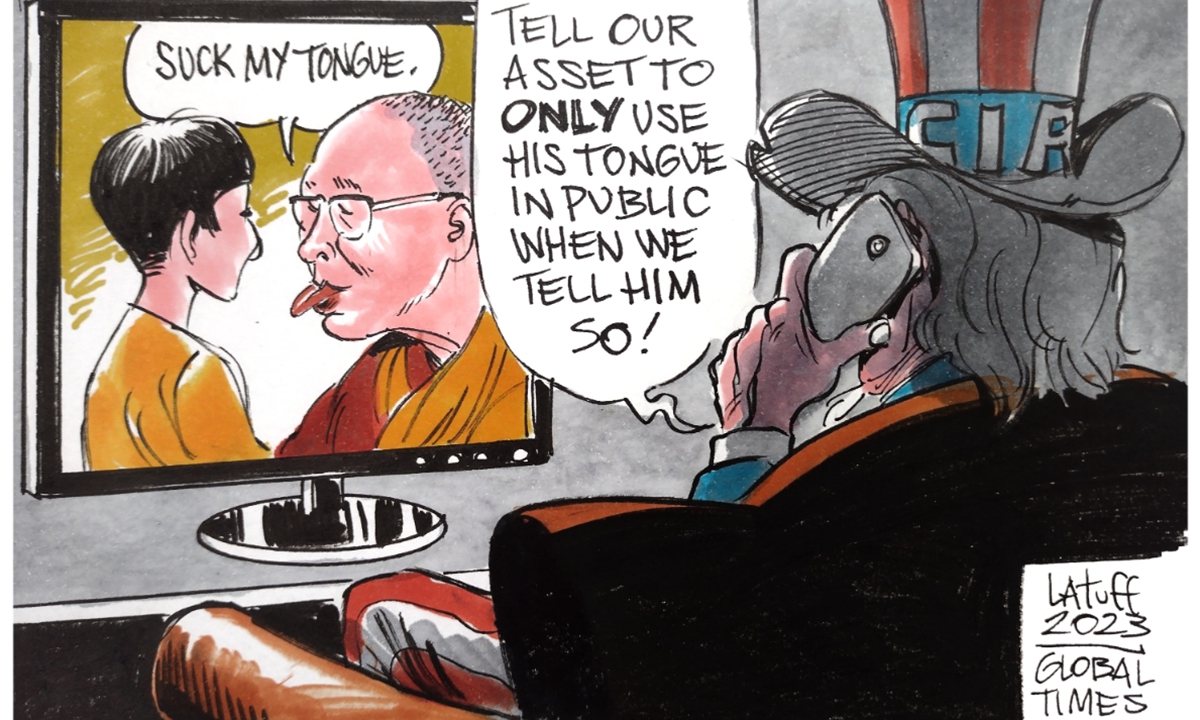
After decades of channeling funds to the Dalai Lama, a moment of a buyer's remorse for the US? Cartoon: Carlos Latuff
The separatist Dalai clique has recently intensified its collusion with American politicians as a group of US lawmakers visited Dharamsala. Analysts believe that their plot to split Xizang from China is destined to fail and warned that the US' latest ill-intentioned bill on Xizang will further damage bilateral relations with China.
A group of US lawmakers, led by Michael McCaul, a Republican representative from Texas, who also chairs the House Committee on Foreign Affairs, met with the 14th Dalai Lama in the northern town of Dharamsala on Wednesday, Reuters reported.
While on June 12, the US House of Representatives approved a so-called "Promoting a Resolution to the Tibet-China Dispute Act," in which it claimed that Xizang region "has not been part of China since ancient times." The bill, which had passed the US Senate, is expected to be signed into law by US President Joe Biden.
Chinese Foreign Ministry spokesperson Lin Jian said at a press conference on Tuesday that it is known by all that the 14th Dalai Lama is not solely a religious figure, but a political exile engaged in anti-China separatist activities under the cloak of religion.
Xizang has always been part of China since ancient times. Xizang's affairs are purely China's domestic affairs and no external interference will ever be allowed. No one and no force should ever attempt to destabilize Xizang to contain and suppress China. Such attempts will never succeed, Lin said, urging the US side to adhere to its commitments of recognizing Xizang as part of China and not supporting "Xizang independence."
"We urge the US to not sign the bill into law. China will take resolute measures to firmly defend its sovereignty, security and development interests," the spokesperson said.
Due to the Dalai clique's openly separatist actions, we believe that any illusions about them are futile and that resolute opposition is the only option, said Zhu Weiqun, former head of the Ethnic and Religious Affairs Committee of the National Committee of the Chinese People's Political Consultative Conference.
Zhu told the Global Times that given the current stability in the Xizang region and other Tibetan areas in China, the actual impact of these US actions is very limited.
As international interest in the Dalai Lama wanes, the Dalai clique's influence is diminishing, and their rhetoric is becoming increasingly anxious. The more the US speaks about Xizang, the more it indicates that their support for the Dalai is a rehash of old issues with increasingly low expectations for the Dalai, said Zhu.
The current visit by US lawmakers, along with a series of moves, aims to generate media hype and draw international attention to Xizang-related issues and such agenda also aligns with some US politicians' intentions to use the "Xizang card" to contain China, Jia Chunyang, an expert at the China Institutes of Contemporary International Relations, told the Global Times.
Dalai Lama is reportedly to travel to the US for knee treatment and will not hold his usual public engagements from Thursday.
Jia noted that the US attempts to challenge China's sovereignty over Xizang region, and if this act is signed into law, it will have a significant impact on the China-US relationship.
Some US politicians are pushing the Xizang-related legislation to seek political influence for themselves, Xiao Jie, a deputy director at the Institute for Contemporary Tibetan Studies under the China Tibetology Research Center, told the Global Times.
This act is ill-intentioned and its harm will be long-lasting. It marks a significant retrograde move by the US' recognition of the one-China principle over the past half-century, severely impacting mutual trust between China and the US, Xiao said.
The act will also send the wrong message to the separatist Dalai clique, encouraging their separatist activities, complicating the situation, and causing new disputes and confrontations, Xiao said.




